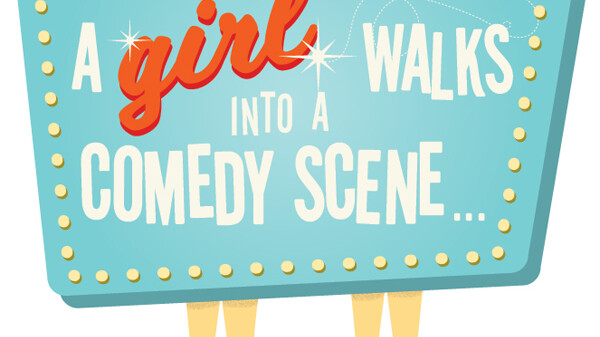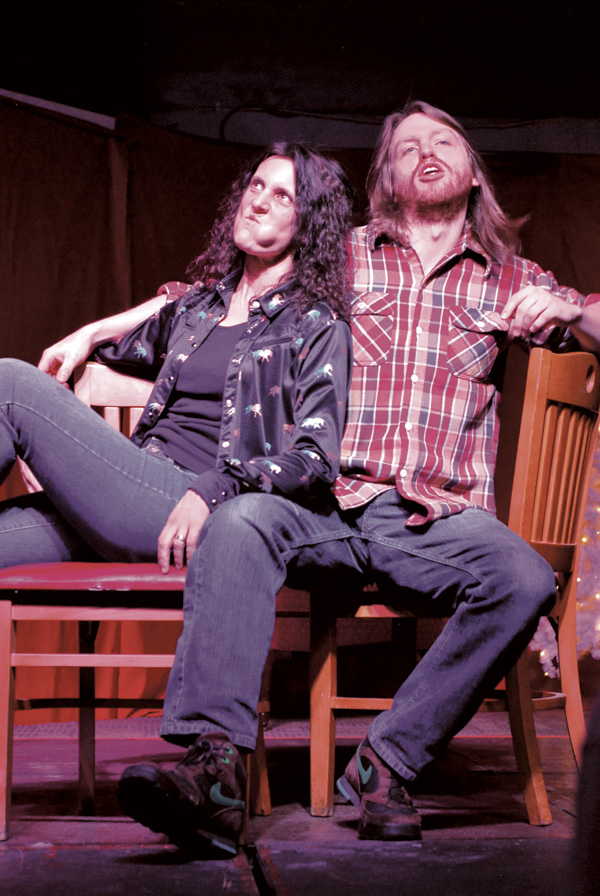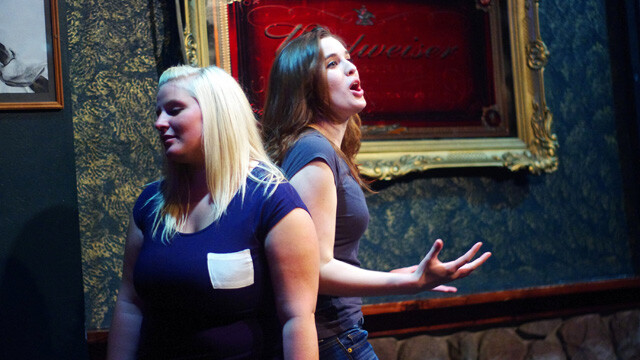So A Girl Walks Into a Comedy Scene...
two women lead the way in local comedy
Mackenzie Bublitz, design by Serena Wagner, photos by Luong Huynh |

On the night of my first improv show with UW-Eau Claire’s The Backwards Thinkers Society, as I collected myself mid-show, I thought, “This is kind of funny.” I wasn’t thinking necessarily ha-ha-funny, but curious-funny. Improv uses no script, only guidelines, attitude, and audience participation to govern a performance, and all this was made funnier by the fact that I am a woman who grew up with an abundance of body-image and self-esteem issues. Even a few years ago, I never would have imagined pursuing improv. I never would have imagined that it would be possible to feel comfortable with an audience of people staring at me, expecting to be entertained.
The poor representation of women in the media is reflected in our comedic outlets and in our everyday lives. We all know that girls, at younger and younger ages these days, become dissatisfied with their bodies and lose confidence in themselves. And ladies, this is a damn shame because we’ve got a lot to share.
The uneven distribution of women and people of color in comedy has had an impact on our perceptions of who’s capable of being funny and who we, the viewers, are going to be laughing, identifying, and feeling with. Unfortunately, there still exist naysayers who claim that women aren’t funny, but these guys are hardly worth mentioning: They aren’t the problem, but simply are a result of the problem.

Thankfully in the local scheme of things, the comedy scene here in Eau Claire certainly isn’t afraid of female leadership. Among our doers and makers is local improv champion Amber Dernbach. In addition to performing with the Improv Lab and raising two daughters, Dernbach has been teaching theater and coaching improv at Memorial High School for 10 years. In that time, not only has the general interest in improv grown at Memorial, but it has become much less of a “white boys’ club” than it was originally. The single improv team has now grown to two teams, one of which is coached by Dernbach, and the other by Julia Jaskulske, a UWEC student and member of The Backwards Thinkers Society, the university’s improv group. The rising interest in improv at Memorial in recent times has not only resulted in additional coaching needs but also has brought diversity. The 2013-14 academic year is the first time in Dernbach’s tenure that there has been an equal number of boys and girls involved, and the members are no longer all white.
This gender progress, however, did not come without time and efforts spent on specifically targeting girls and building confidence through special all-girl workshops. Throughout Dernbach’s tenure as coach, she noticed time and time again in auditions that boys dominated the girls in numbers and in confidence. “There’s very few girls who even come (to auditions), for one thing,” Dernbach says, “and then when they get there, and they walk in, you can tell immediately feel like they’re in the minority. You can sense that.” As a result, girls would often get stuck in stereotypical roles in what Dernbach felt was a sort of defense mechanism. They would play the “angry girl” or the “crab,” while boys were not afraid of being physical and doing things more suited to improv.
“I think many girls have been hardwired from childhood to not want to be ‘the funny ones,’ which is ridiculous because girls are hilarious."
– Julia Jaskulske, improv performer, on why fewer young women reach their performing potential
Jaskulske also commented on the different ways in which she has observed boys and girls perform. “The girls’ comedy typically comes from witty one-liners and, on the whole, the things they say rather than the things they do,” Jaskulske notes. “The boys, on the other hand, tend towards more physical character choices.”
Dernbach has addressed these issues by changing the ways that she runs auditions entirely. Rather than auditioning interested (but largely inexperienced) students in the fall, Dernbach now holds workshops in the spring so that students may gain improv experience before trying out. Additionally, Dernbach holds girls-only workshops at Improv Fest, a Chippewa Valley celebration of Improv via workshops and a whole plethora of shows by local and visiting teams alike. Improv Fest 2013 took place in the heart of December’s holiday shopping mania, giving Eau Clairians a much-needed weekend of relief through humor.
Founded by Dernbach two years ago, Improv Fest has proved to be highly successful in terms of women and girls finding their place comedically. According to Dernbach, these girls-only workshops were more well-attended than any others. “Tons of girls showed up last year (at the workshops),” Dernbach recalls, “and I think that’s why there were tons of girls who auditioned this year.” Clearly, this approach of targeting girls is making a difference. Last fall, more girls than ever auditioned, which resulted in a team composed of strong girls who are not overshadowed by their male teammates. (The female-focused Improv Fest workshop also led Dernbach to form an all-women group, XX.)

To Dernbach and Jaskulske, it’s no mystery why girls tend to be harder to recruit for improv. Both women agree that the issue lies in socialization. “I think many girls have been hardwired from childhood to not want to be ‘the funny ones,’ ” Jaskulske says, “which is ridiculous because girls are hilarious. But it’s always boys who are the ‘class clowns,’ whereas girls are taught to be ‘little ladies.’ It’s tough as a female performer to overcome this, but it’s become even more apparent as I watch the team at Memorial.”
Time and time again, Dernbach has seen girls who do not reach their full performing potential because of the problem that Jaskulske described. “I’ve always felt it was because (girls) care too much about how they look, and that’s the difference,” she says.
Letting go of self-doubt and having a yes-attitude are key components to an individual’s ability to be a good team member in improv. Teams perform well as a whole when each member feels as though she or he belongs in the group, so the confidence of each member obviously plays a big part in the success of the entire team. Dernbach and Jaskulske know this better than anyone, so they make every effort to encourage the girls to initiate, and not to feel afraid. They encourage them to go, go, go.
Overcoming issues of confidence can be plenty hard as a female, but it is entirely possible, especially through the power of positive encouragement and having all these great women around laying the groundwork for us. A few years ago, the idea of public speaking made me want to vomit. But today, I am proud to be one of the newest additions to the Backwards Thinkers Society, a group whose current lineup is more than half female.
Comedy is unique, I think, in that it is at its best when no one is specifically trying to be funny, and the material can just be. Comedy performers shine when there is a wholeness to the performance, when individuals are not bogged down with thoughts of whether or not people in the audience find them attractive or if they’re having a good hair day or not. So if girls are learning every day from popular media and culture that these things are supposed to be of the utmost importance, let’s make an effort to unlearn the lessons. Let’s take a cue from the powerful, trailblazing women we admire, and let’s do whatever it is we do best.
It was Lucille Ball who famously stated: “I’m not funny, I’m brave.” And you know what? I think she was right.




















